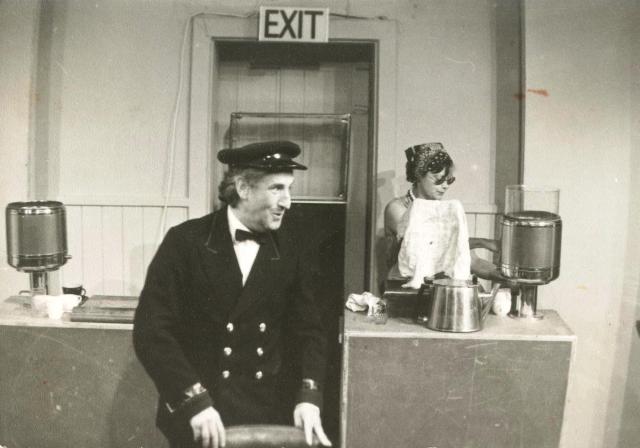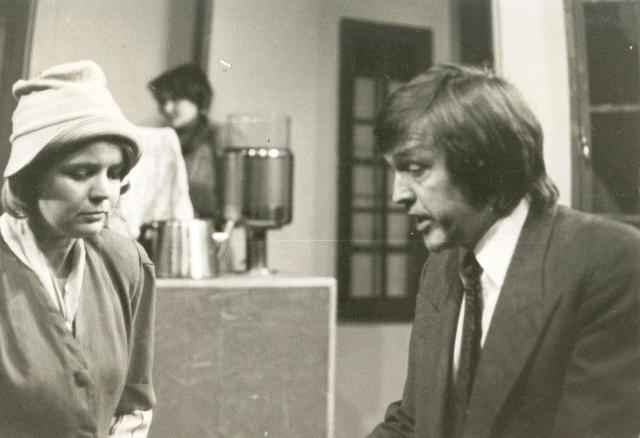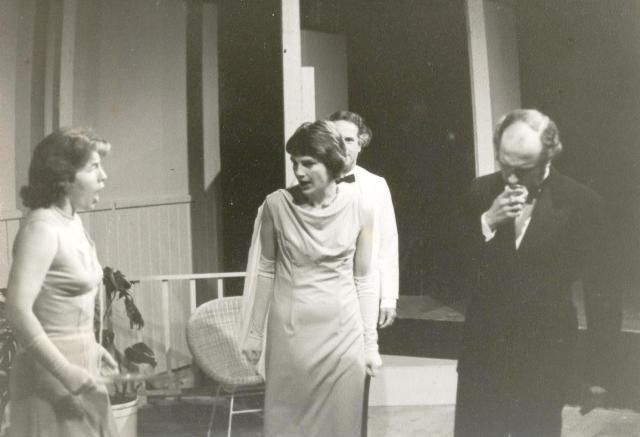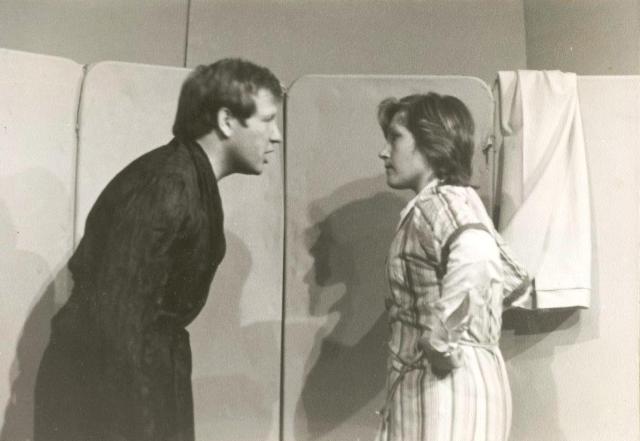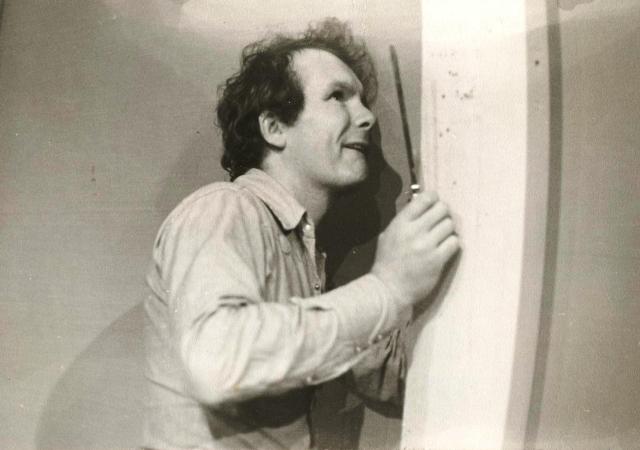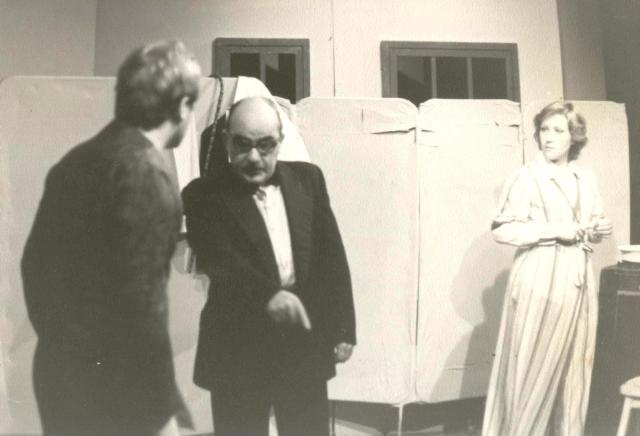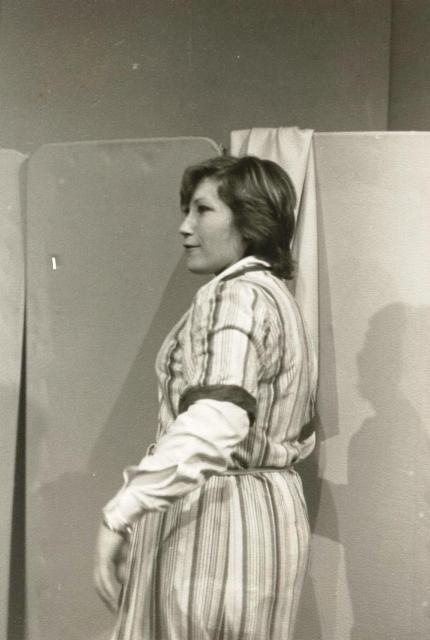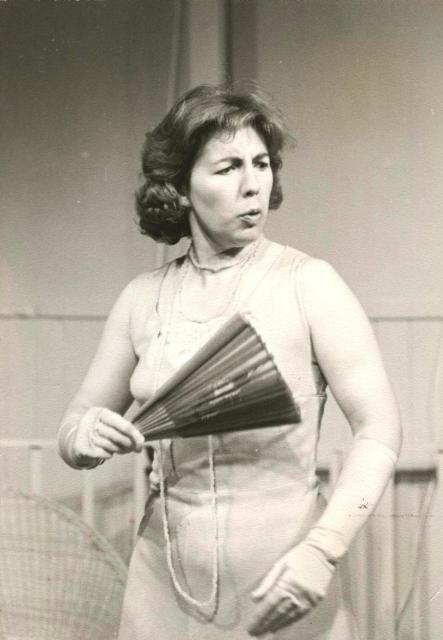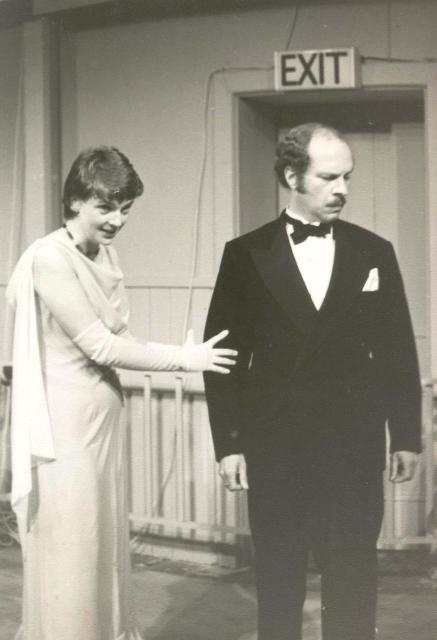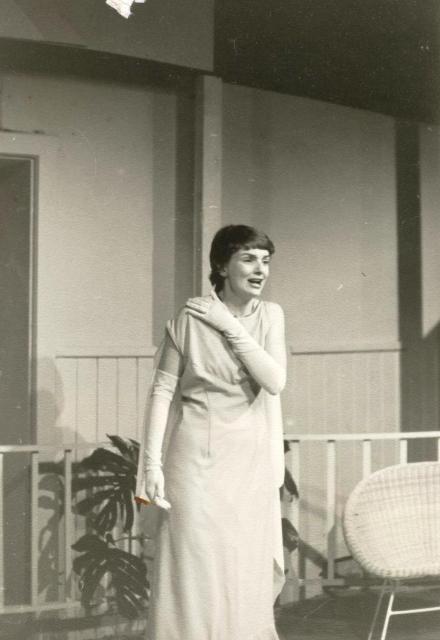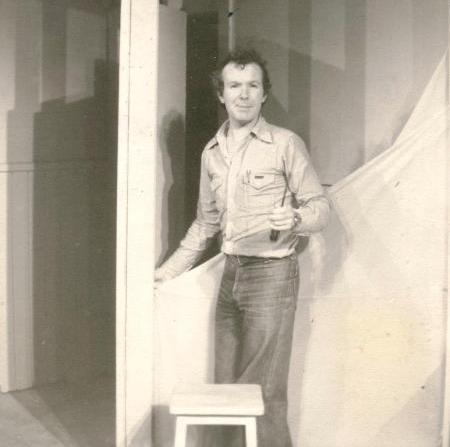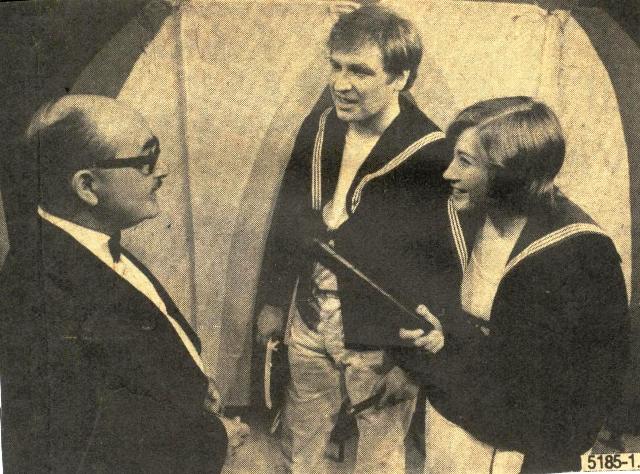Sir Noël Pierce Coward (1899 - 1973)
Noël Coward was not only a prolific playwright but a poet, composer, director, actor and singer too. Well-known for his wit and flamboyance, his work and style continue to influence popular culture.
Born in Teddington, Coward attended a dance academy as a child, making his professional stage debut at the age of eleven. As a teenager he was introduced into the high society in which most of his plays would be set. Coward achieved enduring success as a playwright, publishing more than 50 plays from his teens onwards. He composed hundreds of songs, in addition to well over a dozen musical theatre works, poetry, several volumes of short stories, a novel (Pomp and Circumstance) and a three-volume autobiography. Coward's stage and film acting and directing career spanned six decades, during which he starred in many of his own works.
At the outbreak of World War II, Coward volunteered for war work. He worked with the Secret Service, seeking to use his influence to persuade the American public and government to help Britain. Coward won an Academy Honorary Award in 1943 for his naval film drama, In Which We Serve, and was knighted in 1969. In the 1950s he achieved fresh success as a cabaret performer, performing his own songs and the former Albery Theatre was renamed the Noël Coward Theatre in his honour in 2006.
Tonight at 8.30 is a cycle of ten one-act plays; We Were Dancing, The Astonished Heart, Red Peppers, Hands Across the Sea, Fumed Oak, Shadow Play, Ways and Means, Still Life, Family Album and Star Chamber, and was first produced in 1935. Six of the plays were performed in various combinations of three at each performance, during the original run in Manchester. A seventh was added for a tour and a final three added for a London run in 1936. The plays have enjoyed several major revivals, and several films and television adaptations are based on them. For this production, Bench Theatre staged six of the ten plays, three of which were performed on alternate nights for 8 nights.
For the first set (the Yellow Evening), the director chose 'We Were Dancing', 'Ways and Means' and 'Hands Across the Sea'.
We Were Dancing
Two stylish people, Karl and Louise (a married woman), fall in love at a country club dance on a south Pacific island. They spend the night planning their future, and Karl asks Louise to go to Australia with him, although she prefers South Africa. Her husband, Hubert, pleads with her to leave with him, but to no avail. Hubert departs, asking Karl to make Louise happy. In the cold light of morning, however, not all is as rosy as it was the night before.
Ways and Means
Starting in the bedroom of a French villa on the Cote d'Azur, heiress Stella Cartwright and her gambling husband Toby discuss how they plan to recover money lost at the casino. After tapping an old friend fails, they decide to try to win it back, using the funds from Stella's pawned jewellery. Desperate, having later lost everything they plot to rob and murder a woman who fared much better at the gaming tables, the affluent Pearl Brandt. However before they can put their plan in to action, they themselves are the subject of an attempted burglary. What follows is fiendish in the extreme.
Hands Across the Sea
Two bemused visitors from the colonies take up a casually-made invitation from an upper-class couple to drop in on them at their Mayfair flat when in England. In their enthusiasm for hospitality, the couple issuing the invitation, Commander Peter Gilpin and his wife Lady Maureen have invited so many people to their cocktail party that they can't entirely remember who they asked to come. Among the arrivals, departures, telephone calls and free-flowing alcohol, confusions abound with a final denouement which (while not may be surprising) is desperately embarrassing for all concerned.
For the second set (the Gold Evening), the director chose 'Red Peppers', 'Fumed Oak' and 'Still Life'.
Red Peppers
George and Lily Pepper are a husband-and-wife act in touring music hall. Onstage at a provincial theatre, their act is a mess. Offstage in their dressing room between their two musical performances, the argumentative couple drink beer, eat steaks, comb their wigs, slang each other mercilessly and then join forces to slate the manager. Unfortunately when their spite turns on the musical director, they get more than they bargain for.
Fumed Oak
Breakfast time in the home of Henry Gow, a downtrodden, middle-aged salesman and he eats silently while the three women in his life exchange unpleasantries. His sloppy wife, Doris, and "horrible adenoidal daughter", Elsie, argue about her putting her hair up. Doris and his nagging mother-in-law, Mrs Rockett, quarrel about physical complaints, and Doris suggests that her mother move in with another relative. Just another normal day in his life, however, when he gets home from work that evening, maybe not everything is the same.
Still Life
It's spring and in the refreshment room of Milford Junction railway station, Laura Jesson, a housewife, is waiting for her train home after shopping. She is in pain from a piece of grit that has got into her eye. Alec Harvey, a married physician, who is in the refreshment room removes it for her. Attraction later turns to love and two marriages teeter on the brink. This famous plot was the basis for the award-winning "Brief Encounter, a film starring Celia Johnson and Trevor Howard.
top of page
These plays were staged under Bench Theatre's original company name of Theatre Union, at their theatre in West Street. It was actually the building in West Street, Havant where most of the Company's early plays were staged, which was called the Bench Theatre (after its prior use as a magistrates' court). The company's name was changed gradually by word of mouth and general usage between the years 1973 - 1977 when reviewers, and then members themselves, gradually stopped referring to Theatre Union and started calling the company of players 'Bench Theatre'. The new Company name of Bench Theatre was adopted in to all the promotional literature after they moved from the old theatre (which had been their home for nearly 7 years) in to the Old Town Hall building in East Street.
| Louise Charteris | Nicola Fraser |
| Hubert Charteris | Ian Nelson |
| Clara Bethel | Cindy Prowse |
| Karl Sandys | Derek Cusdin |
| George Davies | David Penrose |
| Eva Blake | Jill Duncan |
| Major Blake | David Spackman |
| Ippaga | Brian Sweatman |
|
| Costumes | Nicola Fraser |
| Props | Will Treend |
| Stella Cartwright | Jen Jones |
| Tony Cartwright | Spokey Wheeler |
| Olive Lloyd-Ransome | Jacquie Penrose |
| Lord Chapworth (Chaps) | Peter Corrigan |
| Nanny | Eve Moore |
| Murdoch | David Spackman |
| Stevens | Paul Morris |
| Princess Elena Krassiloff | Jill Duncan |
| Gaston | Brian Sweatman |
|
| Costumes | Jen Jones |
| Props | Will Treend |
| Lady Maureen Gilpin | Robbie Cattermole |
| Cdr Peter Gilpin RN | David Penrose |
| Hon Clare Wedderburn | Ann Brodrick |
| Lt Cdr Corbett RN< | Brian Montefiore |
| Major Gosling | Derek Cusdin |
| Mr Wadhurst | David Spackman |
| Mrs Wadhurst | Janet Simpson |
| Mr Burnham | Brian Sweatman |
| Walters | Sharon Rose |
|
| Costumes | Robbie Cattermole |
| Props | Geoff Findon |
| George Pepper | Paul Morris |
| Lily Pepper | Sharon Rose |
| Bert Bentley | David Spackman |
| Mr Edwards | Ian Nelson |
| Mabel Grace | Jacki Curtis |
| Alf | Brian Sweatman |
|
| Costumes | Janet Simpson |
| Props | Joyce Cusdin |
| Henry Gow | Peter Corrigan |
| Doris Gow | Cindy Prowse |
| Elsie | Ann Brodrick |
| Mrs Rocket | Eve Moore |
|
| Costumes | Eve Moore |
| Props | Sheila Spackman |
| Laura Jesson | Ingrid Corrigan |
| Myrtle Bagot | Jill Sawyer |
| Beryl Waters | Jacki Curtis |
| Stanley | Brian Sweatman |
| Albert Godby | Derek Cusdin |
| Alec Harvey | Brian Montefiore |
| Customer | David Spackman |
| Bill | Spokey Wheeler |
| Johnnie | Paul Morris |
| Mildred | Sharon Rose |
| Dolly Messiter | Jill Duncan |
|
| Costumes | Jill Duncan |
| Props | Shirley Woodmansey |
top of page
Crew
| Director | John Scadding |
| Stage Manager | Peter Duncan |
| Assistant Stage Manager | John Davis |
| Property Manager | Tim Mahoney |
| Set Design and Construction | Ed Sawyer |
| Lighting | Roy Crushley
Tim Morris |
| Sound | Dave Britten |
| Production Assistant | Geoff Findon |
| Front of House | Joyce Cusdin
Sheila Spackman |
Director's Notes
These plays are difficult to do because you have to be truthful and tap dance at one and the same time. These plays are difficult to do because you have to say one thing and be thinking another. These plays are difficult to do because Coward wants lively theatre and plain reality all at once. Like all good plays, these plays are difficult to do but we seem to like doing them.
John Scadding
top of page
The NewsA.F.
'Appetizer' for Coward
Frothy fun and sparkling wit are ingredients which make up much of the Noël Coward theatrical cake. The triple decker served up last night by Havant's Theatre Union - the opening night of their festival of coward - made a delicious appetizer. Last night's three one-act plays were 'We Were Dancing', 'Ways and Means' and 'Hands Across the Sea'. Collectively called the 'Yellow plays', they are more light hearted offerings than the other three in the festival, which are being performed tonight and on alternate nights during the run. Tonight's programme, the 'Gold plays', are 'Red Peppers', 'Fumed Oak' and 'Still Life' are from the nine one-act plays first produced in 1936. Coward's marvellous satirical sense of humour revels in the frivolous pre-war life and affectations of the upper classes - the titles, the Colonials, the plain rich, and hopefully rich - gently digging, but rarely punching.
Producer John Scadding who had the unenviable task of casting more parts that probably even he knew what to do with, is on to a winner. Many of last night's delighted audience must be returning for the second course. The plays run until Saturday and again from next Wednesday until June 18.
The News, 9th June 1977
top of page
Production Photographs
